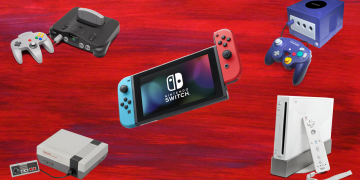It seems Nintendo’s upcoming Switch 2 is set to continue the magic we’ve seen in its predecessor, thanks to NVIDIA’s technology, as images of the new chip have surfaced online.
In this next iteration of the Nintendo Switch, NVIDIA’s Tegra239 chip is at the core, boasting impressive capabilities. While we know the Switch 2 can deliver stunning 4K 60 FPS visuals when docked, the specifics of the chip weren’t crystal clear until now. Nintendo’s existing agreement with NVIDIA indicated they would again utilize these custom Tegra System-on-Chips, leading many to anticipate the use of the next-gen Tegra239. This speculation was recently confirmed when an image of the chip, tagged as “T239,” was shared by @Kurnalsalts, adding more intrigue to the conversation surrounding its capabilities.
The tweet in question, which depicts the chip, doesn’t delve further into specific details, so we are left piecing together existing information about its makeup. What we’ve gathered suggests the Tegra239 chip possibly includes eight Arm Cortex-A78C cores, a hybrid GPU combining Ada Lovelace and Ampere architecture, and 1536 CUDA cores. The processor’s speed ranges from 1.1 GHz up to 1.5 GHz, adjusting dynamically when the device is docked. It’s also expected to feature a 128-bit memory interface utilizing LPDDR5 technology, which is quite impressive.
Although the information on Tegra239 is limited, what’s notable is how the chip supports NVIDIA’s DLSS upscaling technology—a feature that noticeably enhances the console’s performance. For those wanting a more comprehensive breakdown, we’ve previously covered more about the Switch 2’s specifications in another article. It’s clear that with Tegra239, NVIDIA is firmly pursuing its custom ASIC goals, and through collaboration with ARM, it continues to hold an exclusive partnership with Nintendo.
However, another big question looms on the horizon: when will NVIDIA reveal its dedicated chip for the AI-driven PC market? Rumors have been swirling for over a year now, with hints that Team Green might partner with MediaTek to develop an ARM-based SoC, possibly labeled N1X or N1 series. Yet, there hasn’t been an official confirmation or launch date shared, keeping enthusiasts on the edge of their seats.











![[FREE Game] Giveaway for Lost Records: Bloom and Rage on PlayStation 5 (North America) [FREE Game] Giveaway for Lost Records: Bloom and Rage on PlayStation 5 (North America)](https://www.truegames.net/wp-content/uploads/2025/04/FREE-Game-Giveaway-for-Lost-Records-Bloom-and-Rage-on-360x180.jpg)





















![[Industry Insider] Launching a New Era in VR Gaming: ‘The ChicKing Dead’ Now in Early Access! [Industry Insider] Launching a New Era in VR Gaming: ‘The ChicKing Dead’ Now in Early Access!](https://www.truegames.net/wp-content/uploads/2025/04/Industry-Insider-Launching-a-New-Era-in-VR-Gaming-The-360x180.jpg)













